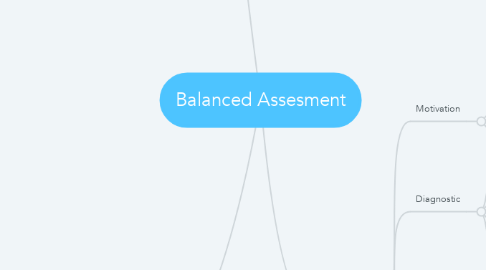
1. What?
1.1. Program of Studies
1.2. 21st Century Skills
1.2.1. Digital Literacy
1.2.2. Comprehensive Health Framework
1.2.2.1. Mental Health Literacy
1.2.2.2. Physical Literacy
1.2.2.3. Nutritional Knowledge
1.2.3. Critical Thinking
1.2.4. Collaboration
1.2.5. Interdisciplinary
2. Why?
2.1. Motivation
2.1.1. Intrinsic
2.1.2. Extrinsic
2.2. Diagnostic
2.2.1. Inform instruction
2.2.2. Student Awareness of knowledge
2.2.3. Improve Instruction
2.2.4. Differentiationm
2.3. Standards
2.3.1. Report Cards
2.3.2. Provincial Achievement Tests
2.3.3. Diploma Exmas
2.3.4. Post Secondary Education
2.4. Relationships
2.4.1. Positive Relationships between students and teachers
2.5. Growth Mindset
2.5.1. Inspire Life Long Learning
2.5.2. Critical & Analytical Thinking
2.5.3. Expand on prior knowledge
2.6. Progress
3. How?
3.1. Formative
3.1.1. For
3.1.1.1. Anecdotal Notes (Sticky Note Records)
3.1.1.2. Exit Slips
3.1.1.3. Peer Review
3.1.1.4. Feedback
3.1.1.4.1. Praise
3.1.1.4.2. Extrerinsic
3.1.1.4.3. Meta Cognitive
3.1.1.4.4. Specific
3.1.1.4.5. Self - Monitoring
3.1.1.4.6. Purpose - Driven
3.1.1.4.7. Personalized
3.1.1.5. Kahoot
3.1.1.6. Quizlet
3.1.1.7. Journaling
3.1.1.8. Checklists
3.1.1.9. Thumbs Up / Thumbs Down
3.1.1.10. Collaborative use of rubrics
3.1.2. As
3.1.2.1. Metacognitive
3.1.2.1.1. Triangle, Square, Cirlce
3.1.2.1.2. One - Minute Paper
3.1.2.1.3. See, Think, Wonder
3.1.2.2. Self-Reflection
3.1.2.2.1. SWOT
3.1.2.2.2. WWW and EBI
3.1.2.2.3. 321 Reflection
3.1.2.3. Journaling
3.1.2.4. Self - Assessment Rubric
3.2. Summative
3.2.1. Of
3.2.1.1. Provincial Achievement Tests
3.2.1.2. Quizes
3.2.1.3. Diplomas
3.2.1.4. Projects
3.2.1.5. Presentations
3.2.1.6. Debates
3.2.1.7. Essays

